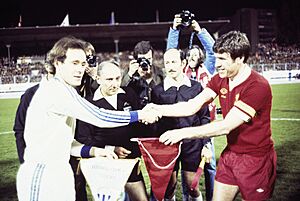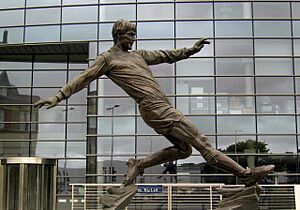Emlyn Hughes facts for kids

Köbi Kuhn and Hughes (right), 6 April 1977
|
|||
| Personal information | |||
|---|---|---|---|
| Full name | Emlyn Walter Hughes | ||
| Date of birth | 28 August 1947 | ||
| Place of birth | Barrow-in-Furness, England | ||
| Date of death | 9 November 2004 (aged 57) | ||
| Place of death | Sheffield, England | ||
| Position(s) | Defender, midfielder | ||
| Senior career* | |||
| Years | Team | Apps | (Gls) |
| 1964–1967 | Blackpool | 28 | (0) |
| 1967–1979 | Liverpool | 474 | (35) |
| 1979–1981 | Wolverhampton Wanderers | 58 | (2) |
| 1981–1983 | Rotherham United | 56 | (6) |
| 1983 | Hull City | 9 | (0) |
| 1983 | Mansfield Town | 0 | (0) |
| 1983–1984 | Swansea City | 7 | (0) |
| Total | 632 | (43) | |
| International career | |||
| 1967–1970 | England U-23 | 8 | (1) |
| 1969–1980 | England | 62 | (1) |
| Managerial career | |||
| 1981–1983 | Rotherham United | ||
| *Club domestic league appearances and goals | |||
Emlyn Walter Hughes (28 August 1947 – 9 November 2004) was a famous English footballer. He was known for his energy and leadership on the field. Hughes played mostly as a defender or midfielder. He started his career at Blackpool in 1964.
In 1967, he moved to Liverpool, where he became a club legend. He played 665 games for Liverpool and was their captain. During his time there, Liverpool won many major trophies. Hughes also played 62 times for the England national team, even captaining his country. After retiring from playing, he became a well-known TV personality, especially on the BBC. He was given an OBE award in 1980 for his contributions to sport. Emlyn Hughes passed away in 2004 at the age of 57.
Contents
Early Life and First Steps in Football
Emlyn Hughes was born in a town called Barrow-in-Furness, England. His father, Fred Hughes, was also a famous sportsman. Fred played rugby league for Great Britain and Wales.
Football Career Highlights
Starting at Blackpool
Emlyn Hughes first tried to join his local team, Barrow, but they didn't give him a trial. So, he joined Blackpool, a First Division team, in 1964. He played his first game for Blackpool that same year. He started as an attacking player but later moved to a defensive midfield role.
Liverpool Years: "Crazy Horse" and Trophies
Becoming a Star
In February 1967, after playing 28 games for Blackpool, Hughes joined Liverpool. The manager, Bill Shankly, was very excited about signing him. Shankly famously told a policeman, "Don't you know who I've got in this car? The captain of England!" Hughes did go on to captain England later.
Hughes made his Liverpool debut on 4 March 1967. He scored his first goal for the club in August of the same year. He quickly became known for his energetic style and was nicknamed "Crazy Horse." He was a versatile player, meaning he could play in different positions, including left back and central defence. This skill was noticed by England's coach, Alf Ramsey.
Hughes played his first game for England in November 1969. He scored his only international goal against Wales in 1972.
Winning Trophies
The early 1970s were a time of change for Liverpool. Manager Bill Shankly brought in many new, younger players. Emlyn Hughes, still young himself, stayed with the team. In the 1970–71 season, Liverpool reached the FA Cup final but lost to Arsenal. Hughes was very upset after the loss.
In 1973, Hughes won his first League title with Liverpool. He also won his first European trophy, the UEFA Cup, that same year. After some great performances, he was made Liverpool captain. He received the FA Cup trophy from Princess Anne in 1974 after Liverpool beat Newcastle United 3–0 in the final.
Captaining England and Europe
In May 1974, Emlyn Hughes was also made captain of the England team. He led England for the first time in a match against Wales, which England won.
Under manager Bob Paisley, Liverpool continued to be very successful. They won another League championship and the UEFA Cup in 1976.
The 1976–77 season was a huge one for Hughes. Liverpool aimed to win three major trophies: the League, FA Cup, and European Cup. They won the League title but lost the FA Cup final. However, just four days later, Hughes captained Liverpool to win their first ever European Cup in Rome! He was also named the Football Writers' Association Footballer of the Year for his amazing performances.
In 1978, Hughes captained Liverpool to win the European Cup again, making it two years in a row. This allowed him to lift the famous trophy for a second time.
Leaving Liverpool
By the next season, Hughes played fewer games for Liverpool. In August 1979, he was sold to Wolverhampton Wanderers for £90,000. He left Liverpool after playing 665 games and scoring 49 goals. He was the club's most capped player for England for many years.
Later Clubs and England Caps
Wolves and Final England Games
Hughes made his debut for Wolves in August 1979. In his first season with the club, he won the League Cup. This was special because it was the only major English trophy he hadn't won with Liverpool. He lifted the trophy as captain after Wolves beat Nottingham Forest.
He continued to play for England even after leaving Liverpool. He played his 62nd and final game for England in 1980. He was also part of the England squad for the European Championship finals in Italy, but he didn't play in any matches. Emlyn Hughes was one of only five players to play for England in three different decades.
Player-Manager at Rotherham
In 1981, Hughes left Wolves to join Rotherham United as a player-manager. This meant he would both play for the team and manage them. In his first season, Rotherham had a great run of nine wins in a row, climbing high in the league. However, the next season, the team struggled, and Hughes was sadly sacked as manager in March 1983.
Other Teams
After Rotherham, Hughes also played for Hull City, and later became a director there. He briefly joined Mansfield Town and then Swansea City, where he finished his playing career.
Life After Football
After retiring from football, Emlyn Hughes became a popular TV personality. He was a team captain on the BBC quiz show A Question of Sport. He was known for his competitive spirit and funny reactions when he couldn't remember an answer. In one famous moment, he thought a muddy jockey was John Reid, but it was actually Princess Anne! Later, Princess Anne joined his team on the show.
Hughes also worked as a football expert on radio and TV. He was at the Heysel Stadium disaster in 1985, where he famously said, "Football has died and the hooligans have won." He also covered the Hillsborough disaster in 1989. After the Hillsborough tragedy, he visited the parents of a fan who was badly injured to offer them support.
He also wrote a column for the teenage football magazine Match.
Final Years and Lasting Memory
In his later years, Emlyn Hughes lived a quieter life. He sometimes gave speeches. In 1992, he appeared on the TV show GamesMaster to promote a football video game named after him, Emlyn Hughes International Soccer.
In 2003, it was announced that he was suffering from a brain tumour. He had surgery and other treatments. Emlyn Hughes was married to Barbara and had two children, Emlyn Jr. and Emma Lynn.
His last public appearance was at the Grand National horse race in 2004. He passed away at his home in Sheffield on 9 November 2004, at the age of 57. A minute's silence was held at Anfield, Liverpool's stadium, the next evening to remember him.
Legacy
Eight days after Hughes' death, England players wore black armbands in a friendly match. Emlyn Hughes was voted No.10 in a poll of "100 Players Who Shook The Kop" on Liverpool's official website.
In 2008, a statue of Emlyn Hughes was unveiled in his hometown of Barrow-in-Furness. It stands in front of a building called Emlyn Hughes House, named after him. A charity that supports people with epilepsy, FABLE, also has Hughes as its chief patron. In 2020, another statue of Hughes being carried by Bob Paisley was unveiled at Anfield.
Awards and Recognition
In 1980, Emlyn Hughes was awarded the Officer of the Order of the British Empire (OBE) for his services to football. He was also featured on the TV show This Is Your Life.
In 2008, Hughes was inducted into the National Football Museum's Hall of Fame. This honour recognizes the greatest players in English football history.
Major Trophies Won
Liverpool
- Football League First Division: 1972–73, 1975–76, 1976–77, 1978–79
- FA Cup: 1973–74; runner-up: 1970–71, 1976–77
- FA Charity Shield: 1974, 1976, 1977
- European Cup: 1976–77, 1977–78
- UEFA Cup: 1972–73, 1975–76
- UEFA Super Cup: 1977
Wolverhampton Wanderers
- Football League Cup: 1979–80
Individual Awards
- Rothmans Golden Boots Awards: 1973, 1974
- FWA Footballer of the Year: 1977
- Officer of the Order of the British Empire: 1980
See also
- Emlyn Hughes International Soccer - a computer game named after him
 | William Lucy |
 | Charles Hayes |
 | Cleveland Robinson |


